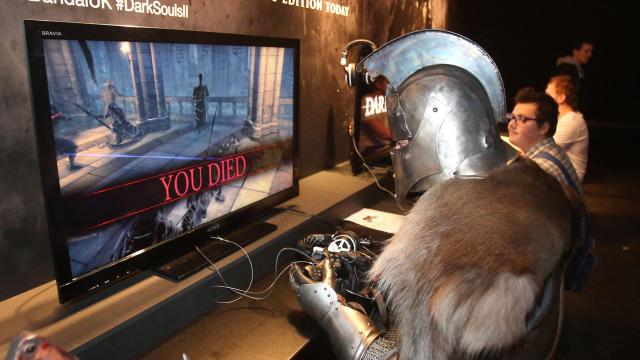When was the last time a video game secret felt genuinely, well, secret? A month? A year? Or maybe that should be 10 years — given that we’re currently marking the decade anniversary of Dark Souls, a game so steeped in delicious obscurity that it’s hard to believe it spawned one of the most resolutely influential gaming franchises of the modern generation.
Dark Souls has been praised, dissected, and doled out as parts exhaustively over the last decade, both by its own creators, by critics, and by the hordes of imitators it’s spawned. But few of those followers were ever daring enough to be as deliberately, irritatingly obtuse as From Software’s masterpiece, a game that will hide an entire optional area behind an invisible door… that’s hidden behind a second invisible door. (Madness!)
Deliberately trafficking in the much-derided design principles that brought us games like the NES’s Castlevania 2 — possibly the first game to ever straight-up just lie to its players, for fun — Dark Souls comes jammed with the sorts of secrets that seem to exist only to make the people designing them laugh. Oh, you didn’t think to run the wrong way from the game’s starting area, dodging dozens of respawning skeletons, kiting past a giant demon with a lightning trident, and then curling up in a coffin, all so a skeleton man can let you join his secret club? Weird: It seemed obvious to me.
Much has been made of Souls’ “My uncle at Nintendo swears you can do X” energy, a playground gossip vibe enforced by a set of in-game communication tools that allowed players to drop their own obscure hints into the world for others to read/be tricked into jumping off a cliff by. (Also, an absolutely staggering amount of misogynistic bullshit surrounding every single female NPC; fix yourself, gamers.) And even then, my above description of how to join the first game’s Gravelord Covenant — which, to be clear, is a real benefit that has hefty mechanics associated with it, which must have taken many hours of human energy to program in — sounds kind of like bullshit to me, and I’m the one who wrote it.
The most shocking thing about all these secrets, then, is that they’re happening in games that were published by companies like Namco Bandai and Sony, large, serious corporations who typically like to ask large, serious questions, like, “Why are we paying a programmer to code a pig to dig up a secret pickaxe, but only if the player leads it through three-quarters of the level that they have no reason to do?” (Love you, Dark Souls II.)
It’s a wild aspect of From’s history: They seem to have gone so quickly from total obscurity, pumping out Kings’ Field and Armoured Core games, to total cultural domination, that there was never a point where executives could step in and say, “Hey, maybe don’t trigger a special version of the boss fight that happens only if a player is wearing a particular hat.” Even the company’s later games, edges-sanded-off efforts like Dark Souls III and Sekiro, are unafraid to get unapologetically unclear from time to time.
It’s a spirit that’s exceedingly rare to see in corporate game-making, a world where every title has to pass certification, please the executives, and meet its quota of publisher-mandated achievements. It’s part of why Souls — despite its now massive sales and popularity — somehow captured the energy of the indie spaces, where these kinds of beautiful self-indulgences are far more commonplace, better than any other “AAA” game of its generation. To draw a parallel that’s been on my mind lately on account of the recent release of Deltarune: Chapter Two, it’s the one clear link you can draw between Dark Souls and Toby Fox’s Undertale, games that vary in theming, visuals, genre, design, and more, but are united in the joy of inviting players to excavate them for secrets so strange and elaborate that they don’t feel like they could be real. (Deltarune, happily, keeps that vibe alive; there is some nasty stuff lurking beneath the sequel’s candy-coloured shell.)
Dark Souls’ legacy is far more than just its secrets. Its world design, its writing, and, yes, the relative difficulty of its combat, have all been more influential on gaming at large. But when the game makes me smile in my memory, it’s not the victories I’m remembering — it’s the strangeness, which is personal and private and beautiful in the way only a really good secret can be.

Comments